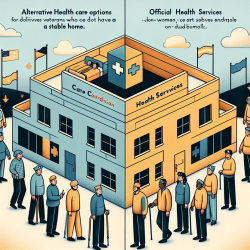Effective care coordination is critical for improving health outcomes among homeless veterans who often receive services from both VA and non-VA providers. The study titled “Walking in a maze”: community providers’ difficulties coordinating health care for homeless patients, highlights significant challenges and offers recommendations to address these issues.
Here are the key findings and actionable steps practitioners can take:
- Understanding the VA System: Community providers often lack sufficient knowledge about the VA’s structure, eligibility criteria, and available services. Implementing a “VA 101” training course for non-VA providers can bridge this knowledge gap.
- Improving Communication: The study found that clear and regular communication between HCH programs and VA medical centers is lacking. Establishing defined communication channels and a designated VA liaison can enhance information exchange and coordination.
- Access to Medical Records: Non-VA providers face difficulties in accessing VA medical records, leading to duplicated tests and fragmented care. Providing non-VA providers with access to VA electronic medical records or utilizing a continuity of care record (CCR) can mitigate these issues.
- Collaborative Partnerships: The study emphasizes the importance of collaboration between VA and non-VA providers. Formal partnerships can leverage the unique expertise of each organization to provide comprehensive care to homeless veterans.
Implementing these recommendations can significantly improve care coordination, reduce inefficiencies, and enhance the overall quality of care for homeless veterans. For practitioners, staying informed and actively seeking collaboration with VA counterparts is essential.
To read the original research paper, please follow this link: “Walking in a maze”: community providers’ difficulties coordinating health care for homeless patients.










